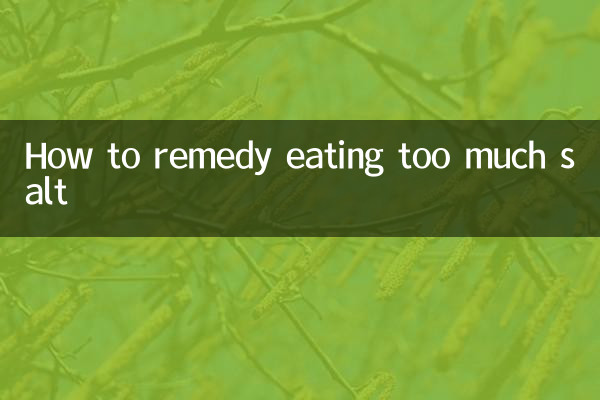How to remedy eating too much salt
High salt intake has become a common problem in modern diets. Excessive salt intake may lead to health risks such as high blood pressure, edema, and increased burden on the kidneys. So, what should you do if you accidentally eat too much salt? This article will combine the hot topics and hot content on the Internet in the past 10 days to provide you with scientific and effective solutions.
1. The harm of high-salt diet

Excessive intake of salt can cause many negative effects on the body. The following are the main hazards:
| Hazard type | Specific performance |
|---|---|
| high blood pressure | Excessive sodium ions can lead to increased blood volume and increased blood pressure |
| Edema | Retention of water in the body, causing swelling of the face or limbs |
| Kidney burden | Excess sodium requires kidney metabolism and may damage kidney function in the long term. |
| cardiovascular disease risk | High-salt diet linked to heart disease, stroke and more |
2. Remedies for eating too much salt
If you accidentally consume too much salt, you can relieve it through the following methods:
| Remedy | Specific operations | scientific basis |
|---|---|---|
| drink more water | Drink plenty of boiled water or light salt water to promote sodium excretion | Water can dilute the sodium concentration in the blood and speed up metabolism |
| Supplement potassium | Eat high-potassium foods such as bananas, spinach, and potatoes | Potassium can balance sodium levels in the body and relieve edema |
| Sweat during exercise | Sweat through aerobic exercise to eliminate excess salt | Sweat contains sodium ions, and exercise can accelerate excretion |
| Reduce subsequent salt intake | Choose a low-salt diet in the next few days to avoid increasing the burden | Control daily salt intake to no more than 6 grams |
3. Suggestions on preventing high-salt diet
It is better to prevent it in advance than to remedy it afterwards. The following are healthy eating tips that are hotly discussed across the internet:
1.Read food labels: Processed foods often contain invisible salt, so pay attention to the sodium content when purchasing.
2.Multi-use natural seasonings: Use onions, ginger, garlic, lemon, etc. to replace part of the salt to increase the flavor.
3.Add salt after cooking: Reduce the amount of salt used while retaining the salty taste.
4.Cultivate light taste: Gradually reduce salt use and allow your taste buds to adapt to a low-salt diet.
4. High-salt diet misunderstandings hotly discussed by netizens
In recent discussions on social platforms about high-salt diets, the following common misunderstandings exist:
| Misunderstanding | truth |
|---|---|
| “If you sweat a lot, eat more salt.” | The general population does not need to supplement additional salt. Appropriate amounts of electrolytes can be supplemented after exercise. |
| “If you don’t eat salty food, you will have no strength.” | Strength is related to energy intake and not directly related to salt |
| “A low-salt diet means eating no salt at all” | Sodium is an essential element and needs to be reasonably controlled rather than completely eliminated. |
5. Summary
The harm of a high-salt diet cannot be ignored, but health risks can be effectively reduced through scientific remedies and long-term prevention. If you accidentally eat too much salt, drinking water in time, replenishing potassium, and exercising to perspire are the key. What's more important is to develop low-salt eating habits and reduce sodium intake from the source. A healthy life starts with a salt spoon at every meal!
(The full text is about 850 words in total, covering recent hot topics and practical solutions)

check the details

check the details